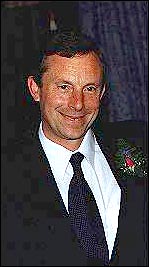– Dorothy – 8/5/97
“Spreading the Word about the World Court Ruling”
This is the fifth of five articles about Commander Rob Green’s transition from trained nuclear killer and to a leading international peace activist. Be sure to read the
first article in the series before this one.
From WCP to Abolition 2000 Rob receives funding from a British Quaker trust in the UK, on the understanding that he works for six months in Britain and six months in New Zealand. He sees his role now as spreading the word about the World Court’s decision and its implications, and to use it to help a new citizen network called Abolition 2000. Supported by some 700 groups worldwide, its central aim is to have in place by the year 2000 a global treaty for the elimination of nuclear weapons.
 |
| Rob Green |
Abolition 2000 is working to encourage governments, especially of the nuclear weapon States to comply with the Court’s judgment. This involves promoting debate at grassroots level and discussion with decision makers: a two-level activity.
Rob is also helping to develop legal support for activists who wish to challenge the nuclear strategies, particularly in NATO countries, in the domestic courts, using the Court decision as a defence. This requires careful planning . Teams of advisers are being formed in Britain, the Netherlands, Germany and the USA. In several cases there has been acknowledgement that the Court decision is relevant – an important achievement as a starting point in the legal campaign.
Canada, India and Japan Work also needs to be done in other countries where there is a chance of making progress – like Canada, Japan and India.
Canada is important as a NATO member and neighbour of the USA, where grassroots consultation has already achieved results. In September 1996, round table discussions were held in eighteen Canadian cities where leaders of civil society were briefed on the Court’s decision and encouraged to express their feelings on the issue. These people were representatives of a complete cross-section of society – political parties, trade unions, women’s organisations, Rotary and many others – not just anti- nuclear groups. They decided to advise the government to take the Court’s decision very seriously and review their whole policy on nuclear weapons. This is of great importance as Canada, though not a nuclear weapon State, is a member of a nuclear-armed alliance and allows within its borders nuclear weapon-related activity such as the mining and refining of uranium.
The plan is to try to repeat that exercise in the UK. This will be much tougher, and will not be attempted until after the General Election in May – because, says Rob “all three main parties are trying to out-macho each other about Trident.” If Labour wins by a landslide, there is hope that they may do something about complying with the Court’s decision.
Rob sees India as a very important priority: “It is sad that at the moment, the highest percentage public opinion in favour of nuclear weapons in the world is in India – 78%; and India has recently been seen as blocking nuclear disarmament. This is contrary to their past fine record, starting with Nehru.” Rob plans to visit India and help to get a quiet debate going among opinion formers: “The problem is that they are not getting any alternative view.”
Japan he sees as “where the future of the nuclear industry will be decided. Apart from France it is the only developed country in the world now where the nuclear industry is continuing to expand. With no indigenous fuel supplies, Japan is in great need of energy, and nuclear power offers a high-tech solution to the problem. Because of the Hiroshima and Nagasaki atomic bombings, and the US/Japan security treaty which puts them under the American nuclear umbrella, there is a deep schizophrenia in the Japanese attitude to nuclear issues. Plutonium, the best raw material for nuclear bombs, is being extracted from Japanese spent nuclear reactor fuel in France and brought back by ship to Japan for use in “fast breeder” reactors which are accident-prone. With the volatile situation in Korea and a history of enmity with China, all the pressures are there for Japan to build its own nuclear weapons – which it could do quickly. There is a great need of help for the grass roots activists in Japan who, while very active and strong, have not managed to achieve nuclear-free status as in New Zealand.”
The Internet’s Vital Role Rob has coordinated the production and dissemination of a booklet to explain the World Court’s advisory opinion on nuclear weapons. He is also organising translation of the booklet into several languages. He says: “The Internet is a fast and inexpensive way of reaching round the world. The English booklet text was sent out immediately. A Russian translation followed soon after. A Japanese translation is being prepared for printing, and hopefully on the Internet as well.”
Closing Reflections Rob reflects on his experience of opposing the nuclear industry: “As with so many current issues, the authorities say ‘All this is too technical for the average citizen to understand. We know. Trust us.’ Jargon is used to put up a smokescreen, hiding principles which are well within the grasp of the average citizen. We need to do our own homework and become informed – and thereby to rumble the abuse of science and technology by those in power. Then we can learn to exercise citizenship, break through the deference to authority which has silenced and disempowered us, and effect change. I have learned to be a citizen, not just a subject.
“The other ploy by authorities is secrecy. How do we get the information and how do we prevent it from being suppressed? Using the Internet is one valuable way of tackling this problem.”
“There is also a need for ordinary citizens to do their homework about the law, and its relation to morality and society. The other tragedy of our times has been the abuse of the law by our governments. The WCP was a classic struggle between raw power politics and the law. Its success has been an encouraging example to me of how ordinary people respond deeply to an issue combining morality and justice. It also epitomised Margaret Mead’s famous words: ‘Never underestimate the power of a small group of thoughtful, committed citizens to change the world. Indeed, it’s the only thing that ever has.’
“I believe that this is directly linked to most of the problems of the world, and especially to peace. You cannot have peace without justice, and you cannot have justice without respect for the law. The nuclear weapon issue is a catalyst for tackling the other problems. This is because the five permanent members of the Security Council are the five declared nuclear-armed nations; and they have abused the United Nations to promote their vested interests. It is high time that the UN’s own court, the International Court of Justice, is used to call them to account. Indeed, now that the Court has effectively outlawed nuclear weapons, who are the “rogue” States?”
People Making Changes Main Page




